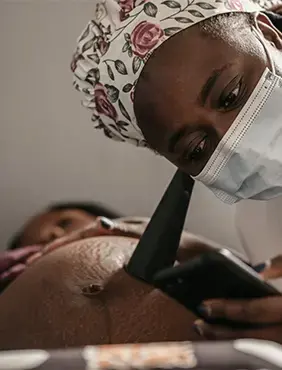A commitment to accelerate progress and keep moving forward, no matter the challenges that arise, is at the heart of the UNFPA’s mission. This commitment guided the work of the Angola Country Office in 2022. Despite challenges to progress following the COVID-19 pandemic and the prolonged drought in several southern provinces of Angola, working with our partners, the UNFPA Angola Country Office continued to deliver life-saving and life-changing results towards universal access to sexual and reproductive health and rights (SRHR).
EXPANDING SRHR SERVICES In 2022, we reached over 1.2 million people with quality sexual and reproductive health (SRH) services, including 500,000 women with emergency obstetric and neonatal care. In addition, we trained over 200 health providers in drought-affected areas to support expectant mothers and newborns.
INVESTING IN ADOLESCENTS AND YOUTH A more sustainable future requires timely and insightful demographic data and investment in young people so that they can make informed choices and reach their potential. We supported the development of the National Adolescent Health Strategy, which includes international health standards for adolescents and youth and launched the Safeguard Young People Programme (SYP). The five-year SYP program will contribute to the achievement of universal access to sexual and reproductive health for 60,000 young people. It will focus on expanding adolescent and youth-friendly health services, leading the menstrual health management program and supporting youth as leaders and change agents in SRHR.
FULFILLING THE RIGHT TO MENSTRUAL HEALTH We built on our previous success, using technology-based solutions to accelerate access to SRH information and services. Approximately 17,000 nurses nationwide benefited from the Safe Delivery App translated into Portuguese to improve health providers' knowledge and practice on Emergency Obstetric and Neonatal Care. While, Oi Kambas, a free mobile application, that provides information on a wide range of health and well-being topics to young people, was developed to help young people make safe and informed choices regarding their sexual and reproductive health.
ACCELERATING GENDER EQUALITY While gender equality is a key priority in Angola, gender-based violence (GBV), harmful practices, early marriage and pregnancy continue to prevent millions of women and girls from participating equally in society. In 2022, we supported the Ministry of Social Action, Family and Women Promotion (MASFAMU) to create a GBV Statistical Portal, to improve data collection on GBV cases and better understand the nature and extent of violence. We also supported the development of the National Strategy to end child marriage and teenage pregnancy. The strategy seeks to discourage cultural practices that limit women's and girls' rights and promotes a human rights approach to traditions and customs. Further progress was made on the establishment of the Angola Gender Observatory (OGA) to track and report progress on gender equality. The OGA will contribute to monitoring SDG 5 on Gender Equality and gender-sensitive indicators across the SDGs and the National Development Plan.
PREPARING FOR CENSUS 2024 In November 2022, the world's population breached the 8 billion mark. Angola, with approximately 33.1 million people, contributed 0.41 per cent. Angola will have a clearer picture of its current population when it holds its national Population and Housing Census in 2024, giving much-needed disaggregated data on households. UNFPA continued to support Census preparations by carrying out a capacity assessment and subsequently training INE officials and technical staff to ensure census data collection and use meets international standards. The results presented in this report are the culmination of efforts by multiple partners steered by the Government of Angola. We are grateful for the continued support of our donors and the dedicated work of our implementing partners. As we head into the last year of the 8th annual program in 2023 and prepare for the International Conference on Population and Development (ICPD) 30 review process in 2024, we will continue to fine-tune our activities and push for bold results to ensure the implementation of the Nairobi commitments. This is the time to accelerate our efforts. Even in the face of climate-induced natural disasters, food insecurity and the rising cost of living, we must continue to focus unwaveringly on our fundamental vision where every pregnancy is wanted, every childbirth is safe, and every young person's potential is fulfilled.
A more sustainable future requires timely and insightful demographic data and investment in young people so that they can make informed choices and reach their potential.


